-
Paul Ehrlich: Human Technological Achievement Has Outpaced Ethical Evolution
›September 25, 2008 // By Rachel Weisshaar Human beings have harnessed culture and technology to become the most dominant animals on Earth, said Paul Ehrlich at a September 18, 2008, launch of his new Island Press book, The Dominant Animal: Human Evolution and the Environment, but “we’re really backward ethically—in terms of how we treat each other and…the environment. And this leads to a lot of problems, not the least of which is we’re destroying our life-support system.”
Human beings have harnessed culture and technology to become the most dominant animals on Earth, said Paul Ehrlich at a September 18, 2008, launch of his new Island Press book, The Dominant Animal: Human Evolution and the Environment, but “we’re really backward ethically—in terms of how we treat each other and…the environment. And this leads to a lot of problems, not the least of which is we’re destroying our life-support system.” -
Drought, War, Refugees, Rising Prices Threaten Food Security in Afghanistan
›September 23, 2008 // By Rachel WeisshaarDrought, continuing violence, returning refugees, and the spike in global food prices are combining to produce a serious threat to Afghan food security, reports the New York Times. The World Food Program has expanded its operations in Afghanistan to cover a total of nearly 9 million people through the end of next year’s harvest, sending out an emergency appeal to donors to cover the costs.
According to a report published earlier this year by Oxfam UK,[W]ar, displacement, persistent droughts, flooding, the laying of mines, and the sustained absence of natural resource management has led to massive environment degradation and the depletion of resources. In recent years Afghanistan’s overall agricultural produce has fallen by half. Over the last decade in some regions Afghanistan’s livestock population has fallen by up to 60% and over the last two decades, the country has lost 70% of its forests.
A post-conflict environment assessment conducted by the UN Environment Programme (UNEP) in 2003 confirms these dire trends in further detail. “In some areas, we found that up to 95 percent of the landscape had been deforested during the conflict—cut for fuel, bombed to remove cover, or removed to grow crops and graze livestock. Many people were fundamentally dependant on these forests for livelihoods. Without them, and without alternatives, Afghans were migrating to the cities or engaging in other forms of income generation—such as poppy production for the drug trade—in order to survive,” writes UNEP’s David Jensen in a forthcoming article in ECSP Report 13.
Despite the fact that agriculture has traditionally employed or supported approximately 80 percent of Afghans, says Oxfam, donors have vastly underinvested in the sector, spending only $300-400 million over the past six years directly on agricultural projects—a sliver of overall aid to Afghanistan.
Not only does hunger have negative impacts on health and economic growth, it could also make the security situation worse. “Development officials warn that neglecting [agriculture and development in] the poorest provinces can add to instability by pushing people to commit crimes or even to join the insurgency, which often pays its recruits,” reports the Times. In addition, an Oxfam International survey of six Afghan provinces found that land and water were the top two causes of local disputes.
To head off greater food insecurity and potential threats to overall stability, Oxfam UK recommends the development of a comprehensive national agricultural program; improved land and water management capacities; and greater support for non-agricultural income-generating activities, such as carpet-making.
Photo: An irrigated area near Kunduz, in northern Afghanistan. Courtesy of UN Environment Programme (source: Afghanistan Post-Conflict Environmental Assessment). -
Niger Delta Militants Escalate Attacks, Days After Government Establishes Ministry to Aid Delta’s Development
›September 19, 2008 // By Rachel WeisshaarNiger Delta militants destroyed Royal Dutch Shell’s Orubiri flow station on Tuesday and blew up a major oil pipeline near Rumuekpe on Wednesday, according to statements from the Movement for the Emancipation of the Niger Delta (MEND), the main insurgent group. On Monday, militants attacked other Shell oil facilities, killing a guard and forcing nearly 100 workers to evacuate. Clashes between the militants—who demand a larger share of the oil revenue and greater political autonomy for Niger Delta residents—and the Nigerian army have reduced the country’s crude oil output by more than 20 percent since 2006. The conflict is “perhaps the most significant, most volatile, and potentially dangerous in that part of the world,” says Wilson Center Africa Program Director Howard Wolpe, who is part of a working group formed to advise policymakers on the issue.
On Wednesday, MEND announced it was broadening the scope of its land attacks beyond Rivers state, the heart of the Niger Delta, and would also seek to target offshore oil rigs. On September 14, MEND declared an all-out war on the Nigerian government for the first time—only three days after its declaration of a cease-fire. The cease-fire came in response to the Nigerian government’s announcement of the creation of a new ministry to accelerate infrastructure development, job creation, and environmental cleanup in the impoverished region.Perhaps the declaration of both cease-fire and war within the space of three days is not so surprising, given the disagreement among Niger Delta leaders over the new ministry. In an online statement, MEND said,
The people of the region should receive this latest dish with apprehension and not allow the over five decades of starvation to rule our emotions as this is not the first time such ‘palatable’ offers have been served to the region from the late 50’s to date. Creating a ‘Ministry’ is not the coming of the much awaited messiah. Nigeria has in existence, ministries over 40 years old which have not positively impacted on the people. It will be yet another avenue for corruption and political favoritism.
Yet People’s Democratic Party Chief Okotie-Eboh had a different take: “It is a very good measure and it shows the sincerity of President Yar’Adua to resolving the Niger Delta crisis. We should give him a chance. This ministry will get allocations like other ministries to tackle the problems of the Niger Delta.”
Although views on the new ministry vary widely, all agree that the Niger Delta faces several grave security, economic, and environmental threats. For instance, an International Crisis Group report recently concluded that one “major issue that has to be dealt with in the context of reconciliation [between the Ogoni people and Shell] is environmental clean-up. No significant study has been conducted to determine reliably the precise impact of oil industry-induced environmental degradation on human livelihoods in the area, but there are indications of severe damage.”
Yet the Delta must also contend with the longer-term implications of its demographic challenge. Forty-five percent of Nigeria’s population is younger than 15, which amounts to a serious youth bulge. The government’s chronic inability to provide these young people with education, health care, and jobs is likely contributing to instability in the Delta.
Photo: MEND fighters and hostages. Courtesy of Dulue Mbachu and ISN Security Watch. -
Middle East at Forefront of Environmental Peacebuilding Initiatives
›September 9, 2008 // By Rachel Weisshaar The Middle East is home to some of the most intractable conflicts in the world. But it is also generating some of today’s most creative approaches to peacebuilding—several of which use the environment to promote harmony and stability.
The Middle East is home to some of the most intractable conflicts in the world. But it is also generating some of today’s most creative approaches to peacebuilding—several of which use the environment to promote harmony and stability.
Time magazine recently highlighted the efforts of Friends of the Earth Middle East (FOEME) to restore the Jordan River to a more healthy, natural state (video). Currently, the Israeli and Jordanian governments both heavily subsidize water for farmers, who grow unsustainable, water-intensive crops. As a result, in many places, the Jordan River has been reduced to a sluggish, polluted trickle. The water level in the Dead Sea, which is fed by the Jordan, sinks approximately one meter each year because it is no longer being replenished. In addition, according to FOEME, because much of the Lower Jordan River “is a closed military zone and off limits to the public, most people simply do not know that the river is drying up.” If less water were diverted from the Jordan, pollution were reduced, and access to the river were increased, FOEME believes that local communities could establish—and thrive on—ecotourism and sustainable agriculture.
FOEME has also proposed the creation of a transboundary peace park on an island in the middle of the Jordan, and has secured the endorsements of the mayors and communities on both sides of the river.
A USAID-supported project on the Israeli-Jordanian border—this one in the Arava desert—brings young people together to study the environment in an attempt to forge personal connections and build peace. The students study the survival mechanisms of desert fauna and flora; learn how to tap solar energy and build structures out of natural materials; and are even carrying out research on the controversial plan to divert water from the Red Sea into the Dead Sea. One-third of each semester’s students are Israeli Jews; one-third are Arabs from Israel, Jordan, the Palestinian territories, or other nations; and one-third are American and European. “The main problem in the Middle East is that people don’t know their neighbors,” says Rabbi Michael Cohen, founding faculty member of the Arava Institute for Environmental Studies, which runs the program.
Photo: The Jordan River is only a muddy trickle in many places. Courtesy of Flickr user j.fisher. -
Testing the Waters: How Common is State-to-State Conflict Over Water?
›August 7, 2008 // By Rachel Weisshaar I was lucky enough recently to vacation in Israel—and I still have the jet lag to prove it. On the second day of the trip, as we crossed the Jordan River and entered the Golan Heights, our guide explained that people have fought over water throughout history—especially in the Middle East. “Aha!” I thought to myself. “Another example of how the average person mistakenly believes that water scarcity leads to conflict—whereas, as an Environmental Change and Security Program staff member, I know that interstate ‘water wars’ are actually incredibly rare.”
I was lucky enough recently to vacation in Israel—and I still have the jet lag to prove it. On the second day of the trip, as we crossed the Jordan River and entered the Golan Heights, our guide explained that people have fought over water throughout history—especially in the Middle East. “Aha!” I thought to myself. “Another example of how the average person mistakenly believes that water scarcity leads to conflict—whereas, as an Environmental Change and Security Program staff member, I know that interstate ‘water wars’ are actually incredibly rare.”
Yet our guide proceeded to describe several water-related conflicts between Israel and its neighbors before and after the 1967 Arab-Israeli War. So when I returned to the States, I was inspired to look up these events in the Pacific Institute’s Water Conflict Chronology and in Oregon State University’s Transboundary Freshwater Dispute Database. I found that Israel and its neighbors were frequently engaged in violent conflict with one another over water during the 1960s and early 1970s. For instance, after Syria began diverting the headwaters of the Jordan River in 1965—a project that would have deprived Israel’s National Water Carrier of approximately 35 percent of its water and the country as a whole of around 11 percent of its water—Israel responded with a series of military strikes against the diversion works. The back-and-forth attacks helped instigate the 1967 Arab-Israeli War.
Another example: In 1969, Israel, which believed that Jordan was overdiverting the Yarmouk River, bombed Jordan’s East Ghor Canal. The United States mediated secret negotiations in 1969-1970, and the Jordanians were allowed to repair the canal in exchange for abiding by Johnston Plan water quotas and expelling the Palestinian Liberation Organization from Jordan.
So how do we explain the apparent disconnect between the numerous instances of violent conflict over water in the Middle East and political scientists’ insistence that water rarely leads to interstate conflict? I think the answer is twofold. First, I happened to be standing in the region of the world that is by far the most prone to conflict over water. There were only 37 violent interactions over water between 1946 and 1999, and 30 of these were between Israel and a neighbor. Water experts recognize that the Middle East is the exception to the general pattern of water disputes leading to cooperation, not conflict. But to Middle Easterners like my Israeli guide, it may indeed seem that water frequently leads to conflict.
Second, the devil is in the definitions. The Transboundary Freshwater Dispute Database classifies events according to its Water Event Intensity Scale, which runs from -7 (“formal declaration of war”) to 7 (“voluntary unification into one nation”). The East Ghor incident is classified as -6 (“extensive war acts causing deaths, dislocation or high strategic cost”). Events classified as -6 can include “use of nuclear weapons; full scale air, naval, or land battles; invasion of territory; occupation of territory; massive bombing of civilian areas; capturing of soldiers in battle; large scale bombing of military installations; [and] chemical or biological warfare,” so they seem to differ from war only in that war has not been formally declared.
Perhaps this is where much of the confusion comes from: Political scientists studying water conflict use a very narrow definition of war—probably a lot narrower than that of most non-experts. So while the average interested citizen would likely call the 1965-1967 conflict between Israel and Syria over the National Water Carrier and the Headwater Diversion project a war—or at least a high-level interstate conflict—the political scientist studying water conflict and cooperation would not.
Now, as a general principle, I’m all in favor of precise language and definitions. But formal declarations of war seem to have gone out of fashion over the past half century; the United States, for instance, has not formally declared war against another country since World War II. If the current war in Afghanistan were over water—which it decidedly is not—would it still merit only a -6 on the Water Event Intensity Scale because the United States has not formally declared war against the Taliban? It seems that requiring a formal declaration of war to classify a conflict as a war is perhaps defining the term too narrowly.
But although political scientists may be to blame for clinging to a somewhat outdated definition of war, the media are perhaps at fault for using the word too broadly in an attempt to make their headlines more enticing. This editor concludes—only somewhat self-servingly—that we would all benefit from using language more precisely. I welcome your responses.
Photo: The Golan Heights landscape still bears scars from the 1967 Arab-Israeli War. Courtesy of Rachel Weisshaar. -
Defense, Development, Diplomacy Experts Debate DoD’s Role in Development
›July 18, 2008 // By Rachel Weisshaar“The U.S. military recognizes that the use of conventional military force is of limited use” in advancing U.S. national security, said Reuben Brigety II, director of the Sustainable Security Program at the Center for American Progress (CAP), at a July 18 launch of his report Humanity as a Weapon of War: Sustainable Security and the Role of the U.S. Military. The tragedy of 9/11, as well as the setbacks experienced in the wars in Afghanistan and Iraq, emphasized to the U.S. defense community that although combat operations remain critical to its mission, the military must also strive to “prevent conflict from emerging in the first place” through activities that stabilize societies, economies, and governments.
Brigety cited efforts by the Combined Joint Task Force for the Horn of Africa (CJTF-HOA), the nascent U.S. Africa Command (AFRICOM), and the U.S. Southern Command (SOUTHCOM) as examples of the U.S. military’s growing appreciation of how development assistance can help stabilize countries, build goodwill toward the United States, and increase U.S. understanding of local socio-political and economic conditions. In recent years, CJTF-HOA has dug wells, vaccinated livestock, and provided health services, while SOUTHCOM has a long track record of providing humanitarian assistance in Central and South America, particularly in the wake of natural disasters.
Although Brigety asserted that it is nothing “new for the military to be involved in addressing basic human needs,” he and his fellow presenters—Elisabeth Kvitashvili of the U.S. Agency for International Development (USAID), James Schear of the Institute for National Security Studies, and Stewart Patrick of the Council on Foreign Relations—agreed that the Department of Defense (DoD) has been undertaking an increasing share of the U.S. government’s development activities in recent years. As Brigety’s report notes, the “share of the U.S. government’s official development assistance, or ODA, spent by the Defense Department increased to 22 percent in 2005, the last year for which complete data is available, from 3.5 percent in 1998. Over the same time period, USAID’s share of ODA fell to less than 40 percent from 65 percent.”
Earlier this week, Secretary of Defense Robert Gates made waves when he said that “the United States military has become more involved in a range of activities that in the past were perceived to be the exclusive province of civilian agencies and organizations. This has led to concern among many organizations…about what’s seen as a creeping ‘militarization’ of some aspects of America’s foreign policy. This is not an entirely unreasonable sentiment.”
At the CAP launch, Patrick asserted that one reason why the DoD has become increasingly involved in development activities—in peaceful regions as well as violent ones—is the “massive budgetary asymmetry” between the DoD and the State Department and USAID. Gates made a similar point: “America’s civilian institutions of diplomacy and development have been chronically undermanned and underfunded for far too long—relative to what we spend on the military, and more important, relative to the responsibilities and challenges our nation has around the world.”
Kvitashvili agreed that USAID is underfunded and understaffed, but said the solution was not having the military take the lead in development activities. She argued that the military—which, unlike USAID, is not staffed by development professionals—tends to engage in “feel-good, short-term, one-off” projects that do not lead to sustainable gains for local populations. Instead, she welcomed a stepped-up supporting role for the military in development activities. -
House Energy Subcommittee Debates Economic, Human, Security Costs of Climate Change
›June 30, 2008 // By Rachel WeisshaarThe cost of taking no action to reduce greenhouse gas emissions would be “equivalent to a 3.6% loss of the U.S. GDP in 2100,” said Sir Nicholas Stern in his written testimony to the Energy and Commerce Subcommittee on Energy and Air Quality last week (archived webcast). “We should emphasize, however, that there are many likely, larger, and deeply damaging, effects which will occur after 2100 and these calculations take no account of the effects on the USA of the damages and devastation which occur outside the USA.”
Stern, who authored the 2006 Stern Review on the Economics of Climate Change, discussed the non-economic costs of climate change, as well. Extreme climate change scenarios “involve movements of population, and we know that movement of population means not only the hardship around the movements themselves, but also conflict,” he said at the hearing.
Sherri Goodman, general counsel of the Center for Naval Analysis (CNA) Corporation, asserted the interdependence of climate change, national security, and energy dependence. “Numerous DoD studies have concluded that high fuel demand by combat forces detracts from combat capability, makes our forces more vulnerable, diverts combat assets from offense to supply line protection, and increases operating costs,” said Goodman’s testimony.
Energy is also a security issue at home. “The Defense Department is almost completely dependent on electricity from the national grid to power critical missions at fixed installations,” explained Goodman. “The national electric grid is fragile and can be easily disrupted, as happened in the Northeast Blackout of 2003, caused by trees falling onto power lines in Ohio. It affected 50 million people in eight states and Canada, took days to restore and caused a financial loss in the U.S. estimated to be between $4 billion and $10 billion. As extreme weather events become more common [due to climate change], so do the threats to our national electricity supply.”
A day earlier, two other House committees discussed the newly completed—and still classified—National Intelligence Assessment on the U.S. national security implications of climate change. -
Sparks Fly at Joint Hearing on National Intelligence Assessment of Climate Change’s National Security Implications
›June 26, 2008 // By Rachel Weisshaar“Climate change alone is unlikely to trigger state failure in any state out to 2030, but the impacts will worsen existing problems—such as poverty, social tensions, environmental degradation, ineffectual leadership, and weak political institutions,” said National Intelligence Council Chairman Thomas Fingar at yesterday’s joint hearing of the House Select Committee on Energy Independence and Global Warming and the House Subcommittee on Intelligence Community Management.
The hearing allowed Democrats and Republicans alike to question Fingar and other witnesses on the newly completed, classified National Intelligence Assessment (NIA) on the national security implications of global climate change through 2030. The NIA relies on the mid-range projections in the Intergovernmental Panel on Climate Change’s Fourth Assessment Report, as well as the expert opinions of scientists from the U.S. government and U.S. universities.
“Climate change could threaten domestic stability in some states, potentially contributing to intra- or, less likely, interstate conflict, particularly over access to increasingly scarce water resources. We judge that economic migrants will perceive additional reasons to migrate because of harsh climates, both within nations and from disadvantaged to richer countries,” said Fingar, adding that the United States should be prepared to assist people fleeing flooded coastal areas in the Caribbean.
Domestically, Fingar warned the representatives to expect severe water scarcity in the Southwest, increasingly frequent wildfires, and powerful storms on the East and Gulf Coasts, which could threaten nuclear power plants, oil refineries, and U.S. military installations. The military could also find its capacity overstretched abroad: AFRICOM will be tasked with responding to more frequent disease outbreaks, food scarcity, and land clashes in sub-Saharan Africa, and the U.S. military in general will be called upon to alleviate increasingly common humanitarian emergencies around the world.
According to Fingar, the NIC plans to analyze three subtopics in greater detail: climate change’s security implications for individual countries; its implications for cooperation and competition among the world’s great powers, including the United States, Russia, China, and India; and the security implications of possible climate change mitigation strategies.
Democrats and Republicans butted heads over whether the NIA was a commendable achievement or a distraction from more important security issues, such as terrorism. At one point, Representative Edward Markey (D-MA), chairman of the House Select Committee on Energy Independence and Global Warming, asked Fingar whether he thought climate change could worsen the drivers of terrorism, and Fingar responded that yes, he thought climate change would probably increase the pool of recruits for terrorist activity, which was cause for concern.
Virtually the only issue on which Democrats and Republicans could agree—although for differing reasons—was that the NIA should be declassified. Democrats believed declassification was important so that government agencies and private businesses could begin to prepare for climate change’s impacts, while Republicans argued the NIA should be declassified because they believed the NIC’s analysts, having based their analysis entirely on open-source information, hadn’t contributed anything new to the existing body of knowledge on climate change. Fingar disagreed that secret intelligence is more valuable than open-source information: “Information is information; knowledge is knowledge.”
For her part, Representative Anna Eshoo (D-CA), chairwoman of the Subcommittee on Intelligence Community Management, seemed content to ignore the misgivings of some of her colleagues regarding the NIA. “From this day forward, the words ‘climate change’ and ‘international security’ will be forever linked,” she proclaimed.
Selected news coverage:
Wall Street Journal: Global Warming as Security Issue: Intelligence Report Sees Threat
Reuters: Climate change may strain U.S. forces
MSNBC: Climate change could threaten U.S. security
CNN: Global warming could increase terrorism, official says
Showing posts by Rachel Weisshaar.


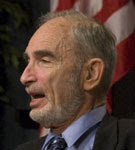 Human beings have harnessed culture and technology to become the most dominant animals on Earth, said Paul Ehrlich at a
Human beings have harnessed culture and technology to become the most dominant animals on Earth, said Paul Ehrlich at a 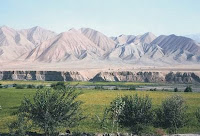
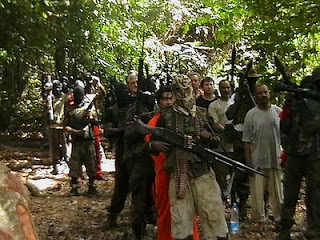
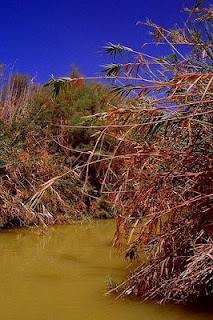 The Middle East is home to some of the most intractable conflicts in the world. But it is also generating some of today’s most creative approaches to peacebuilding—several of which use the environment to promote harmony and stability.
The Middle East is home to some of the most intractable conflicts in the world. But it is also generating some of today’s most creative approaches to peacebuilding—several of which use the environment to promote harmony and stability.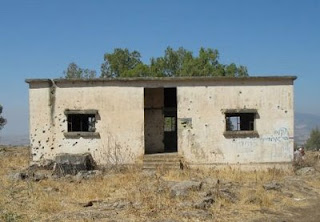 I was lucky enough recently to vacation in Israel—and I still have the jet lag to prove it. On the second day of the trip, as we crossed the Jordan River and entered the Golan Heights, our guide explained that people have fought over water throughout history—especially in the Middle East. “Aha!” I thought to myself. “Another example of how the average person mistakenly believes that water scarcity leads to conflict—whereas, as an Environmental Change and Security Program staff member, I know that interstate ‘water wars’ are actually incredibly rare.”
I was lucky enough recently to vacation in Israel—and I still have the jet lag to prove it. On the second day of the trip, as we crossed the Jordan River and entered the Golan Heights, our guide explained that people have fought over water throughout history—especially in the Middle East. “Aha!” I thought to myself. “Another example of how the average person mistakenly believes that water scarcity leads to conflict—whereas, as an Environmental Change and Security Program staff member, I know that interstate ‘water wars’ are actually incredibly rare.”

